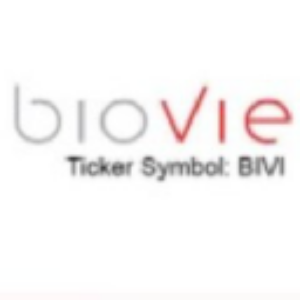BioVie Presents Data Showing Potential for Bezisterim (NE3107) to Reduce Inflammation and Restore Homeostasis in a Manner Correlated with Alzheimer’s Disease and Biomarker Endpoints
- “Bezisterim” has been approved as the non-proprietary name for NE3107
- Data shows how bezisterim may be restoring homeostasis via specific genes associated with dementia, metabolism, and inflammation
CARSON CITY, Nev., April 25, 2024 (GLOBE NEWSWIRE) -- BioVie Inc. (Nasdaq: BIVI), (“BioVie” or the “Company”), a clinical-stage company developing innovative drug therapies to treat chronic debilitating conditions including neurological and neuro-degenerative disorders and liver disease, today announced that an oral presentation and poster revealing additional data on how bezisterim potentially restores homeostasis was presented at the 12th Annual Alzheimer's & Parkinson's Drug Development Summit held in Boston, Massachusetts April 23-25.
The presentation Clinical Outcomes and Biomarker Findings from a Randomized, Placebo-Controlled Trial of Bezisterim in Subjects with Mild to Moderate Probable Alzheimer’s Disease was presented yesterday by Christopher Reading, PhD, BioVie’s Senior Vice President, Alzheimer’s Disease Program.
The data presented were based on further analysis of data generated from BioVie’s Phase 3 trial in Alzheimer’s disease (AD) that was unblinded at the end of 2023. The DNA methylation dataset assessed the extent of DNA methylation on roughly 965,000 individual sites where methyl groups can be attached to the patients’ DNA.
“We all age and get older – nothing can change that. But these data provide evidence that bezisterim may have the potential to help keep people healthier for a longer time as we age,” said Cuong Do, BioVie’s President and CEO. “BioVie believes that DNA methylation may not need to constantly increase as we age, and thus the progression of age-related disease may not be uni-directional. Bezisterim is believed to be the first drug candidate that has shown in clinical trials the ability to modulate the level of DNA methylation, and do so in a manner that’s correlated with disease. But we are only at the beginnings of exploring the full potential of this unique molecule and how it can help modulate the progression of age-related diseases.”
DNA methylation is a natural process where methyl groups are added to the surface of DNA, thereby interfering with the body’s natural process for decoding genetic information. DNA methylation accumulates as people age and can be affected by behavioral (diet, exercise) and environmental factors. Hypermethylation of DNA has been associated with a large number of diseases, including age-related cognitive impairment and dementia, Parkinson’s disease (PD), various forms of cancers, cardiovascular disease (CVD), chronic obstructive pulmonary disease (COPD) and respiratory disease, chronic kidney disease (CKD), inflammatory bowel disease (IBD), sepsis and many others.1 Inflammation has been shown to be a driver of hypermethylation of DNA,2 and the extent of DNA methylation can be measured by various “biological clocks.”
Newly presented data show that patients treated with bezisterim experienced an age deceleration advantage over patients treated with placebo on four biological clocks, in addition to previously published advantage on the SkinBlood Clock3 (-3.68 years, p=0.017). Age deceleration is the difference between a person’s biological age as measured by various DNA methylation clocks and their actual age since birth. A lower value is preferable and suggests that the biological age is lower than the actual age. Bezisterim-treated patients saw -4.77 years advantage on the Inflammation Age Clock4 (p=0.022), -5.0 years advantage on the Hannum Age Clock5 (p=0.006), -1.92 years advantage on the GrimAge Clock6 (p=0.068), and -3.71 years on the PhenoAge Clock7 (p=0.081).
Bezisterim’s ability to reduce DNA methylation appears to target 21 specific genes identified thus far. Statistically significant correlations were found between DNA methylation levels for 15 genes and various clinical measures for bezisterim-treated patients whereas such relationship did not exist among placebo patients. This suggests that the DNA methylation levels among placebo patients accumulated to such an extent that they disrupted the natural linkage between the gene and the clinical measure, and that bezisterim was able to restore such homeostatic relationships. One example of this phenomenon involves the transmembrane protein 237 (TMEM237) gene, which is associated with neurodevelopment delays. Significant correlations were found between improvements in the DNA methylation levels for this gene and improvements in various clinical cognitive assessments among bezisterim-treated patients whereas no such correlations were seen among placebo patients.
Additionally, placebo patients saw statistically significant correlation between DNA methylation levels for 6 pro-inflammatory genes and clinical measures, while bezisterim-treated patients saw no correlations. This suggests that bezisterim disrupted the negative consequences of DNA methylation that promotes inflammation and restored homeostasis.
The impact of DNA methylation and bezisterim’s activity can also be seen at a cellular level. Myeloid lineage cells (monocytes, macrophages, astrocyte and microglia) exist in a continuum between two extremes of promoting inflammation and tissue destruction (M1 and A1 state) and anti-inflammatory, phagocytic and tissue repair (M2 and A2 state). Placebo patients saw a significant correlation between their Monocyte DNA Methylation Clock and the monocyte levels in their blood samples. No such correlation exists, however, for bezisterim-treated patients, suggesting that bezisterim’s impact on DNA methylation may be changing the monocyte DNA methylome from a pro-inflammatory to an anti-inflammatory state (M1 → M2 transition hypothesis).
The name “bezisterim” has been approved as the non-proprietary (generic) name for NE3107 by the United States Adopted Names (USAN) Council and World Health Organization (WHO) International Nonproprietary Names (INN) expert committee.
About Bezisterim
Bezisterim (NE3107) is being investigated for Alzheimer’s disease (AD) and Parkinson’s disease (PD). BioVie has conducted and reported efficacy data on its Phase 3 randomized, double-blind, placebo-controlled, parallel-group, multicenter study to evaluate bezisterim in patients who have mild-to-moderate AD (NCT04669028). Results of a Phase 2 investigator-initiated trial (NCT05227820) showing bezisterim-treated patients experienced improved cognition and biomarker levels were presented at the Clinical Trials on Alzheimer’s Disease (CTAD) annual conference in December 2022. An estimated six million Americans suffer from AD. A Phase 2 study of bezisterim in PD (NCT05083260) has been completed, and data presented at the AD/PD™ 2023 International Conference on Alzheimer’s and Parkinson’s Diseases and related neurological disorders in Gothenburg, Sweden in March 2023 showed significant improvements in “morning on” symptoms and clinically meaningful improvement in motor control in patients treated with a combination of bezisterim and levodopa vs. patients treated with levodopa alone, and no drug-related adverse events.
About BioVie Inc.
BioVie Inc. (NASDAQ: BIVI) is a clinical-stage company developing innovative drug therapies for the treatment of neurological and neurodegenerative disorders and advanced liver disease. In neurodegenerative disease, the Company’s drug candidate bezisterim inhibits inflammatory activation of ERK and NFkB (e.g., TNF signaling) that leads to neuroinflammation and insulin resistance, but not their homeostatic functions (e.g., insulin signaling and neuron growth and survival). Both are drivers of AD and PD. In liver disease, the Company’s Orphan drug candidate BIV201 (continuous infusion terlipressin), with U.S Food and Drug Administration (“FDA”) Fast Track status, is being evaluated and discussed with guidance received from the FDA regarding the design of Phase 3 clinical testing of BIV201 for the treatment of ascites due to chronic liver cirrhosis. The active agent is approved in the U.S. and in about 40 countries for related complications of advanced liver cirrhosis. For more information, visit http://www.bioviepharma.com/.
Forward-Looking Statements
This press release contains forward-looking statements, which may be identified by words such as "expect," "look forward to," "anticipate" "intend," "plan," "believe," "seek," "estimate," "will," "project" or words of similar meaning. Although BioVie Inc. believes such forward-looking statements are based on reasonable assumptions, it can give no assurance that its expectations will be attained. Actual results may vary materially from those expressed or implied by the statements herein due to the Company's ability to successfully raise sufficient capital on reasonable terms or at all, available cash on hand and contractual and statutory limitations that could impair our ability to pay future dividends, our ability to complete our pre-clinical or clinical studies and to obtain approval for our product candidates, our ability to successfully defend potential future litigation, changes in local or national economic conditions as well as various additional risks, many of which are now unknown and generally out of the Company's control, and which are detailed from time to time in reports filed by the Company with the SEC, including quarterly reports on Form 10-Q, reports on Form 8-K and annual reports on Form 10-K. BioVie Inc. does not undertake any duty to update any statements contained herein (including any forward-looking statements), except as required by law.
For Investor Relations Inquiries:
Bruce Mackle
Managing Director, LifeSci Advisors, LLC
bmackle@lifesciadvisors.com
For Media Relations Inquiries:
Melyssa Weible
Managing Partner, Elixir Health Public Relations
mweible@elixirhealthpr.com
1 Wang Z Nucleic Acids Research, 2020, Vol. 48, No. 5; Sugden K Neurology 2022;99:e1402-e1413; Tang X DOI: 10.1002/mds.29157; Tabaeia S Artificial Cells, Nanomedicine, and Biotechnology, 47:1, 2031-2041; Qiu W Am J Respir Crit Care Med Vol 185, Iss. 4, pp 373–381, Feb 15, 2012; Rysz C Int. J. Mol. Sci. 2022, 23(13), 7108; Kraiczy J Mucosal Immunology volume 9, pages 647–658 (2016); Rump K Sci Rep 9, 18511 (2019).
2 Stenvinkel P doi: 10.1111/j.1365-2796.2007.01777.
3 The Skin Blood Clock predicts lifespan and many age-related conditions. Horvath Aging 2018 Jul 26;10(7):1758-1775.
4 The Inflammation Age Clock measures the extent of chronic inflammation and predicts the risk of developing age-related disorders. Sayed Nat Aging. 2021 Jul;1:598-615..
5 The Hannum clock is another clock to measure the extent of DNA methylation. Hannum Mol Cell 24 Jan 2013,
6 The GrimAge clock predicts lifespan and links the extent of DNA methylation “grim events” such as death. McCrory J Gerontol A Biol Sci Med Sci. 2021 Apr 30;76(5):741-749.
7 The PhenoAge Clock predicts a variety of aging outcomes, including all-cause mortality, cancers, healthspan, physical functioning, and Alzheimer's disease. Levine Aging 2018 Apr 18;10(4):573-591.








